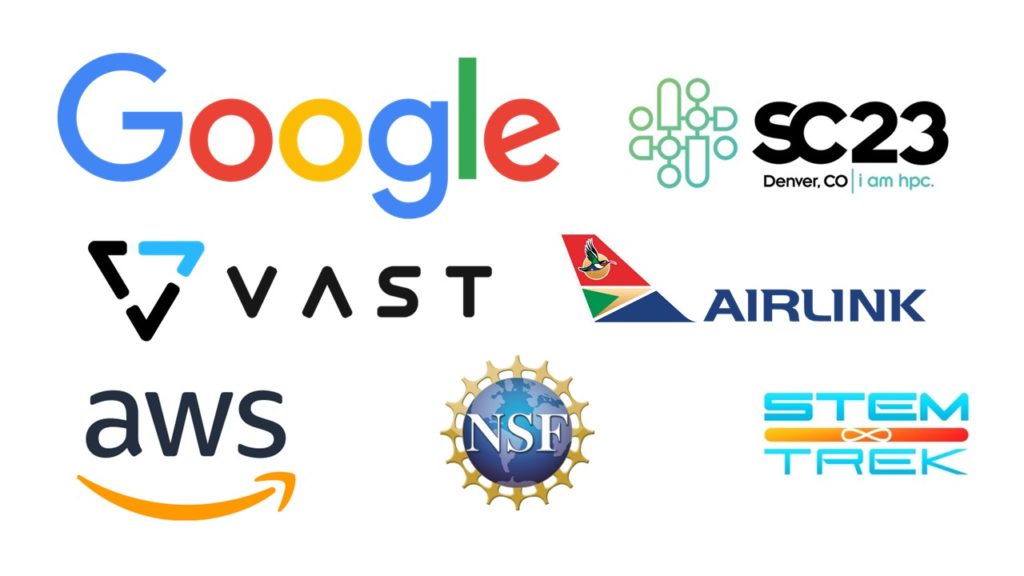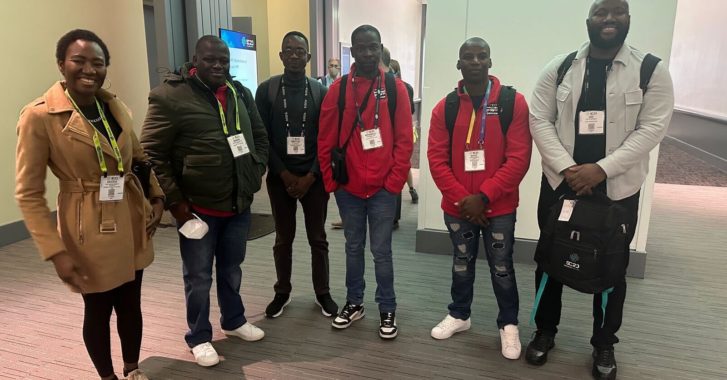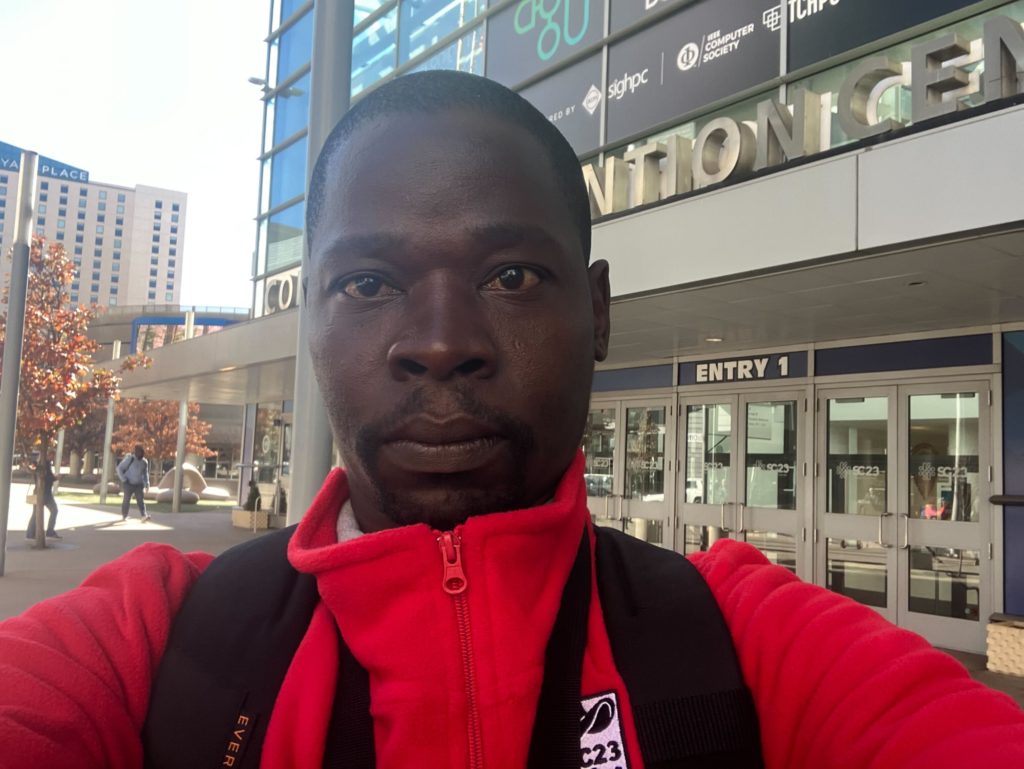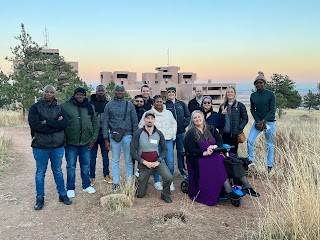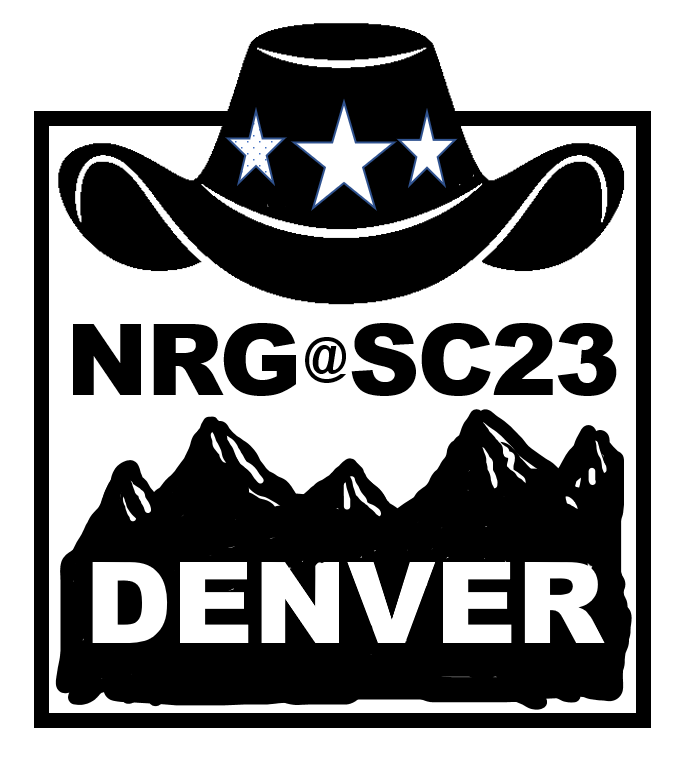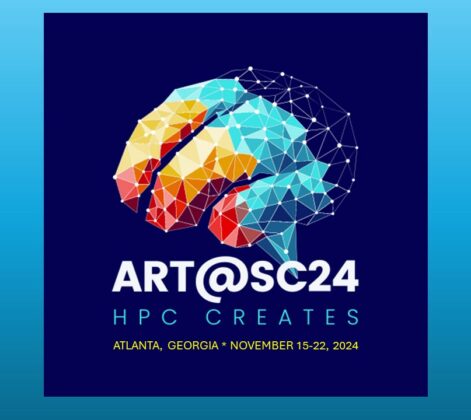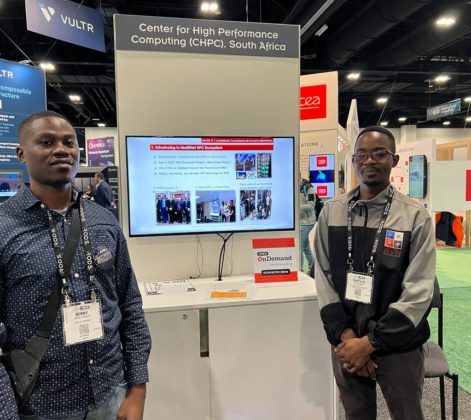By: Mphenduli “Oscar” Ntsizi (University of Fort Hare, South Africa)
On a chilly November day, the African HPC-Ecosystems team embarked on a transformative journey to the U.S. National Center for Atmospheric Research (NCAR) in Boulder, Colorado. The experience was orchestrated by Elizabeth Leake (STEM-Trek), Daniel Howard (NCAR HPC Consultant) and Wenfu Tang (NCAR Project Scientist). The day unfolded with riveting presentations by several NCAR scientists which chronicled several initiatives to accelerate environmental sustainability in Africa.
The University Corporation for Atmospheric Research (UCAR), whose university-driven initiatives complement NCAR’s – the federal organization – sponsors an African initiative. UCAR scientists, U.S. university partners, African researchers, and the global community formed a collective effort to address Africa’s pressing environmental challenges.
Motivated by the African continent’s rapid growth and economic expansion, the UCAR initiative aspires to mitigate environmental issues that contribute to economic loss, premature mortality, and uneven development. Aligned with the missions of NCAR, the UCAR African initiative transfers knowledge and technology for the betterment of life on Earth.
Six scientists presented a range of topics which addressed the carbon cycle, climate change, agriculture, high-impact weather, data assimilation, air pollution, and public health. Their holistic strategy embraces education, training, and outreach, and emphasizes the importance of empowering local communities.
The event planned by NCAR, UCAR, and STEM-Trek showcased a harmonious fusion of visionaries dedicated to shaping a more sustainable and resilient future for Africa. It was an inspiring testament to the power of partnerships and knowledge exchange, and I left NCAR with a sense of optimism, knowing that initiatives like these are forging pathways towards a more sustainable future.
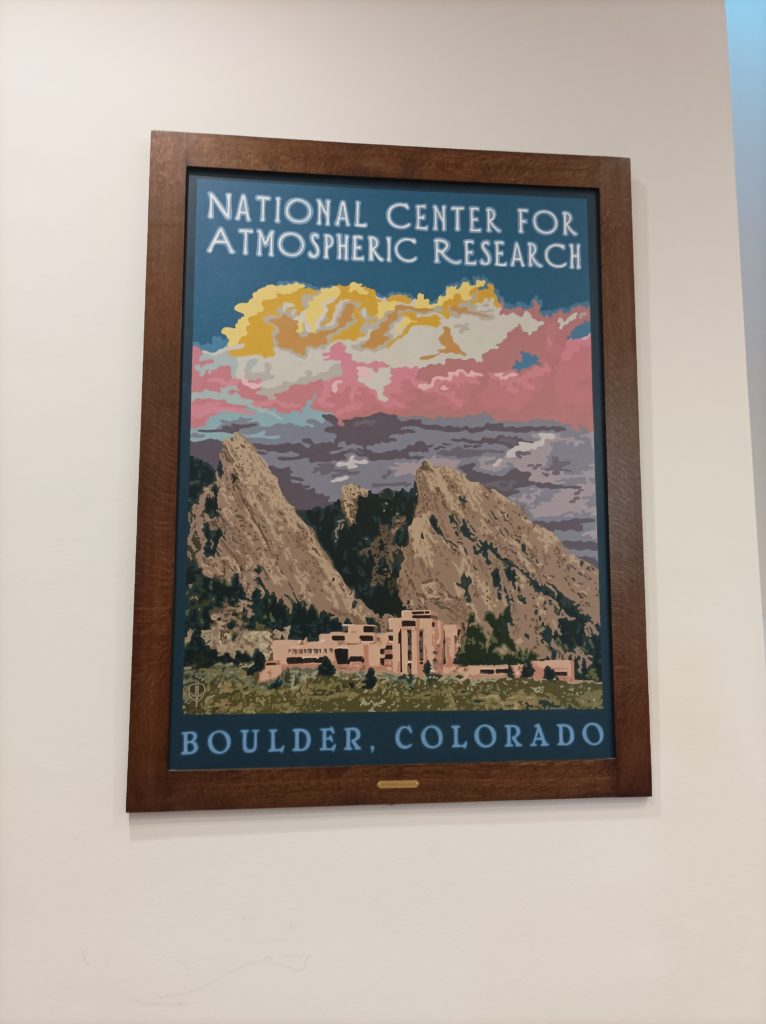
NRG@SC23 Pre-Conference Workshop
The NRG@SC23 Pre-Conference Workshop held on November 10, 2023, at the Colorado Convention Center, Room 203, began with a welcome and orientation by STEM-Trek Nonprofit Founder and Director Elizabeth Leake. The workshop covered a range of energy innovation within the field of high-performance computing (HPC) and ways that data centers will be powered in the future.
Denver Federal Bureau of Investigation (FBI) Field Office agents delivered a brief but insightful session on physical security while visiting Denver and showcased FBI cyber careers. The agenda otherwise featured notable speakers, including Alexander Scammon from G-Research, who discussed open-source development, Kubernetes batch scheduling and more.
Greg Landwehr, Senior Engineer at Scatec ASA Wind Energy Solutions, shared his passion for wind energy meteorology, while Dr. Judith Vidal from the National Renewable Energy Laboratory (NREL) highlighted cutting-edge advancements in thermal systems.
The workshop concluded with interactive introductions, where attendees from six countries and 11 U.S. states, shared challenges in research computing, plotted their locations, and discussed energy trends. The day wrapped up with a lively mixer sponsored by Amazon Web Services, fostering networking and collaboration among delegates.
In summary, the NRG@SC23 Pre-Conference Workshop was a comprehensive exploration of crucial topics in HPC and renewable energy. It connected professionals from around the world so they could lay the groundwork for future collaborations and advancement.
Chronicles of Innovation: NRG@SC23 Day Two
As I stepped into Room 203 of the Colorado Convention Center for the NRG@SC23 Pre-Conference Workshop, little did I know that the day would unfold as a saga of technological narratives, discoveries, and collaborative endeavors.
The PAIN Panel: A Tapestry of Resilience
The PAIN Panel, expertly facilitated by Senzo Mpungose: Center directors, including Martilio Rafael Banze (MoRENet, Mozambique), Happy Sithole (South Africa – Center Manager CSIR-NICIS, former director of CHPC), Ben Rogers (Experience at U-Iowa Research Computing), and Honggao Liu (Executive Director, High Performance Research Computing at Texas A&M), shared tales of unexpected events that hijacked their time, budget, and staff. These seasoned storytellers unveiled strategies that worked and cautioned against pitfalls in Power, Access, Interoperability, and Network realms. The collective wisdom of more than 90 years echoed through the room, leaving us with invaluable insights that were gained through some unfortunate events.

Lunch and Networking: A Feast of Ideas
Sponsored by VAST Data, lunch became a feast not only for the palate but also for the mind. Box lunches in hand, attendees immersed themselves in networking, creating a vibrant tapestry of connections. Amidst the clinking of cutlery and the hum of conversations, stories of technological innovations were shared, setting the stage for the afternoon’s tales to unfold.
Informative Sessions: Community-Driven
Shelley Knuth (U-Colorado at Boulder) painted a vivid picture of the U.S. National Science Foundation’s Office of Advanced Cyberinfrastructure (NSF-OAC) ACCESS project and described resources and services that are available to the U.S. research community via the taxpayer investment.
Honggao Liu (Texas A&M) described ACES (Accelerating Computing for Emerging Sciences), a composable testbed developed by Texas A&M University. A platform that promises unprecedented precision and efficiency. Dr. Liu left us in awe of the possibilities that composability unlocks for artificial intelligence tasks.
Vasilka Chergarova illuminated the room with tales of AmLight, an NSF investment that funded the South Atlantic fiber optic cable that connects Southern Africa to Brazil. Her presentation extended to the Open Science Grid, showcasing distributed computing across continents.
Umesh Upadhyaya shared Nepal’s aspirations to grow its HPC footprint. With research drivers spanning climate, hydrology, seismology, wildlife conservation, and more, the abundance of snowpack in the Himalayan Mountains became a wellspring of interest, particularly for hydro-energy endeavors.
Break: A Moment to Reflect and Connect
The afternoon’s tales paused briefly, allowing attendees to absorb the stories shared, reflect on newfound insights, and engage in impromptu discussions. The room buzzed with the shared energy of a community immersed in the narratives of technological progress.
Daniel Howard (NCAR) described the range of environmental research conducted at NCAR, including wildfire mitigation, cloud-seeding for hydropower, and agricultural outcomes. The collaborative efforts with regional partners, including the C3+3 collective that shares computational resources based at Idaho National Laboratory (Boise State University, University of Idaho and Idaho State University).
Workforce Development Panel: Shaping the Future
Carlie Oakenshield (Southwestern Oklahoma State University) facilitated a panel on HPC workforce development. Panelists included Umesh Upadhyaya (HPC Nepal); Jason Watt (Boise State), Joe Leister (U-Idaho), and Michael Ennis (Idaho State – the three work together on the C3+3 project); Bryan Johnston (South Africa-CHPC), Berny Chiamite and Martilio Rafael Banze (MoRENet, Mozambique), Mmabatho Hashatsi and Lara Timm (South Africa CHPC – all work together on the African HPC Ecosystems Project). Each program shared highlights of their experience with repurposing decommissioned HPC systems. With the C3+3 project, Idaho National Lab hosts the system which had been decommissioned by INL – which helps immensely since they pay for power!
Isango: A Glimpse into Tomorrow’s Innovations
As the day neared its conclusion, Elizabeth Leake (STEM-Trek) and Kurt Keville (UMass-Boston) had intended to share a roadmap of their “Isango” project which was presented at PEARC22, IEEE HPEC22, and HPC-AI’23. Unfortunately, the NRG schedule ran long, and there wasn’t time for Isango. We look forward to hearing about its progress in 2024. Several Isango pioneer planners gathered at NRG@SC23, which offered them a unique opportunity to plan for the future.
As I exited Room 203, the echoes of the day lingered—a symphony of tales that encapsulated the spirit of innovation, collaboration, and boundless possibilities that unfold when passionate minds come together. The NRG@SC23 Pre-Conference Workshop wasn’t just an event; it was a collective narrative, a story of progress, and a testament to the vibrant community that drives innovation for the future.
Thank you sponsors!
